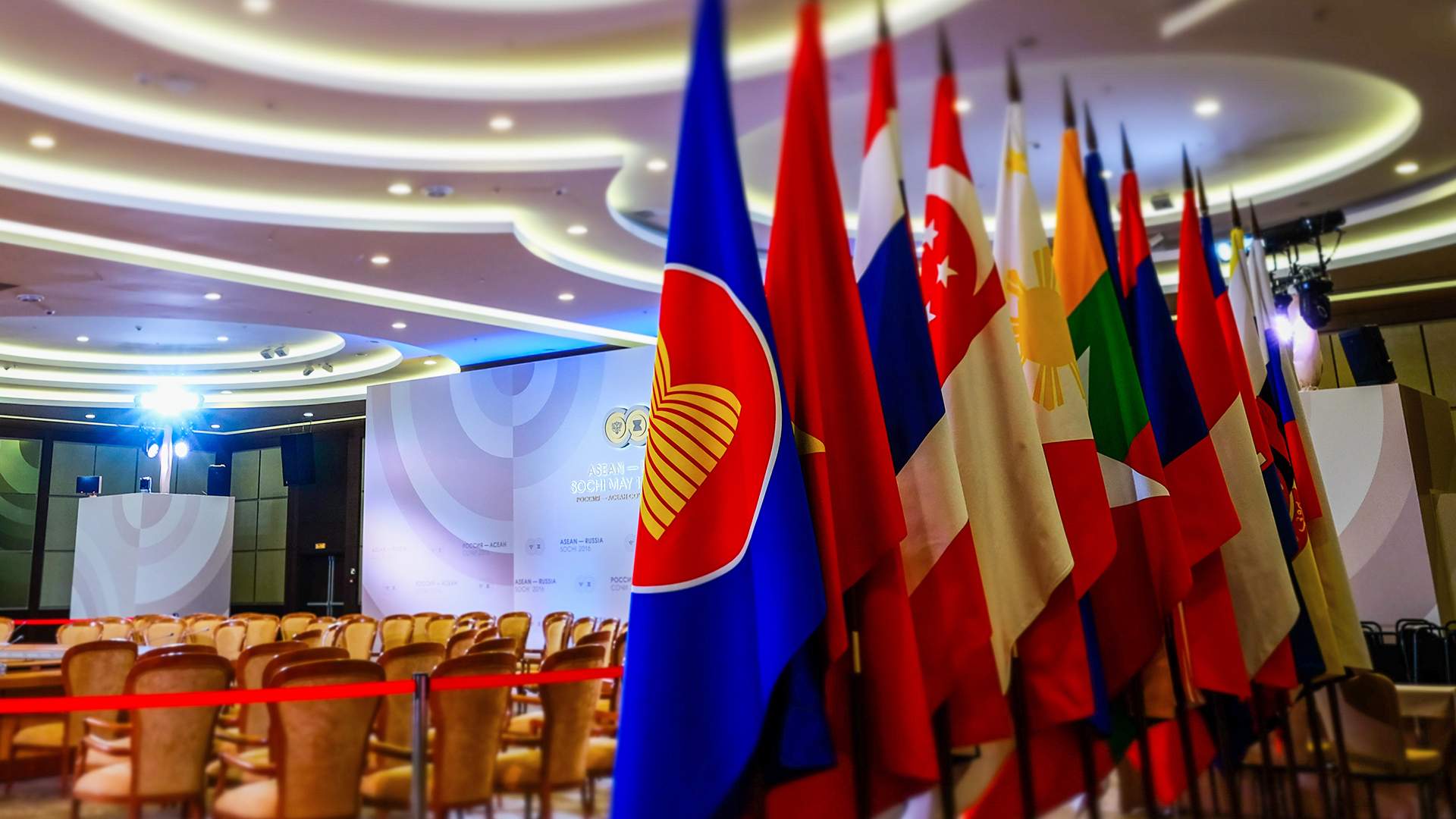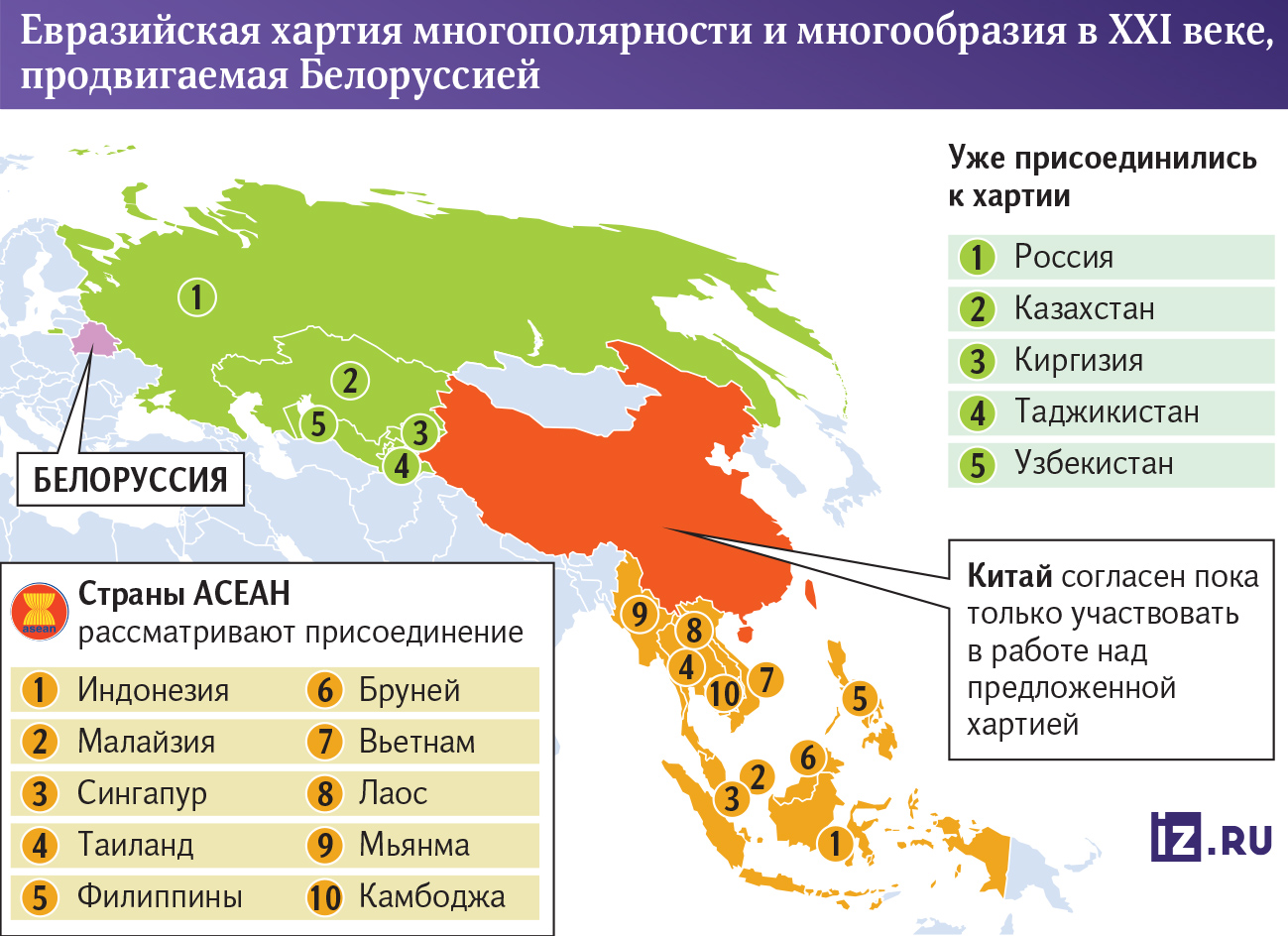- Статьи
- World
- Region of Honor: Russia discusses with ASEAN participation in the Eurasian Charter of Multipolarity
Region of Honor: Russia discusses with ASEAN participation in the Eurasian Charter of Multipolarity

Russia has sent a proposal to the countries of the Association of Southeast Asian Nations (ASEAN) to join the future Eurasian Charter of Multipolarity and Diversity, Deputy Foreign Minister Andrei Rudenko told Izvestia. The document will be developed by the next Minsk conference on security issues. Last year, Belarus proposed to adopt the charter at the level of heads of state. Kazakhstan, Kyrgyzstan, Tajikistan and Uzbekistan have already joined the document. China has expressed interest in working on the project. What are the prospects of the future Eurasian Charter - in the material of "Izvestia".
What countries can join the Eurasian Charter?
The new format of international cooperation, promoted by Minsk - the Eurasian Charter of Multipolarity and Diversity in the XXI century - is gradually reaching the international level. A dialog on the creation of a Eurasian security architecture has already begun. As Russian Foreign Minister Sergei Lavrov emphasized the other day, the charter is open to all states on the continent.
The statement on the common vision of the Eurasian Charter, signed by the Foreign Ministers of Russia and Belarus in November 2024, can be considered the first concrete step. In particular, the parties agreed to enhance the role of international law. As for the main future document, according to Lavrov, Kazakhstan, Kyrgyzstan, Tajikistan and Uzbekistan have already joined it. Moreover, Russia has also sent the proposal to the countries of the Association of Southeast Asian Nations (ASEAN), Russian Deputy Foreign Minister Andrei Rudenko told Izvestia.
- We have submitted it to ASEAN. We are waiting for their reaction," the deputy minister said.
Russia actively cooperates with ASEAN. Since 1996, Russia has become a full-fledged dialogue partner of the organization. Over the past year, Sergey Lavrov has flown to Laos several times to participate in ASEAN events. Today the organization includes Indonesia, Malaysia, Singapore, Thailand, the Philippines, Brunei Darussalam, Vietnam, Laos, Myanmar and Cambodia. And all of them would be interested in joining the charter, Paul Chambers, special adviser on international affairs at the Center for ASEAN Public Studies at Naresuan University in Thailand, told Izvestia.
- The charter emphasizes multipolarity and diversity, themes that ASEAN is precisely promoting to maintain friendly relations with the world. This underpins the relevance of the organization and its efforts to maintain its central role in the region," the expert said. - The same Vietnam has a long history of close relations with Russia. Thailand, Indonesia, Myanmar, Malaysia also seek to maintain a balance between Russia and the US.

Indonesia is likely to be most interested in the concept of the Eurasian Charter. Especially since the country joined BRICS in 2025, thus confirming its multi-vector policy. The members of the association adhere to similar positions, promoting the idea of creating a multipolar world. In the future, BRICS can offer concrete solutions in the sphere of global security. At least for now, the group provides security for members and partners in the economic sphere, including through the New Development Bank, as well as increasing the share of payments in national currencies.
- Indonesia and Vietnam will pay very serious attention to the development of Eurasian security. That said, Indonesia needs some time to conceptualize these ideas, as it has only recently been admitted to BRICS. "The fact is that joining BRICS may raise questions from Indonesian international partners, while the current government does not seem to be ready to respond," Teuku Rezashia, an associate professor of international relations at the University of Padjadjaran and Presidential University in Indonesia, remarked in a conversation with Izvestia.
However, it is important to emphasize that in ASEAN, decisions are made only by consensus. Singapore, for example, which pursues a rather pro-Western policy and even imposed sanctions against Russia against the backdrop of the Ukrainian conflict, may be less interested in the charter. According to the expert, ASEAN may be present as an observer at the Minsk Security Conference for the time being.
The concept of Greater Eurasia
The idea of the Eurasian Charter of multipolarity and diversity in the XXI century arose precisely at the Minsk Conference. It was first held in the fall of 2023. The project of such conferences is seen as a kind of alternative to the Munich Security Conference. And every year it proves its worthiness. At the second meeting on October 31-November 1, 2024, they discussed a very ambitious topic - the prospects for Eurasian security against the background of the crisis of the existing world order. The main leitmotif of the conference was, of course, the Ukrainian crisis.
A number of high-ranking officials from both Asian and European parts of the continent came to the Belarusian capital. Among the speakers were Sergei Lavrov, his Hungarian counterpart Peter Szijjarto, and Serbian Deputy Prime Minister Aleksandar Vulin. China is also interested in this format, which has a significant impact on the security architecture not only in the region, but also, perhaps, in the whole world. Back in July 2024, it became known that Beijing would participate in the work on the charter proposed by Minsk. The parties agreed on this at the talks between the foreign ministers.
Chinese Foreign Minister Wang Yi did not come to the conference last fall, but the government's special envoy for Eurasian affairs Li Hui, who, in particular, is engaged in resolving the Ukrainian crisis on behalf of Beijing, holding talks with representatives of Russia, Ukraine and Western countries involved in the conflict, flew to Minsk. The event was also attended by the secretaries-general of the CIS and CSTO, representatives of other states and major regional organizations, including the OSCE, the SCO and ASEAN. In total, the conference attracted about 600 participants from 45 countries.
- Both our friends and our enemies and just neutral countries understand that the former system of world order organization is either being destroyed or has already been destroyed. Belarus, on the one hand, is in a close military, economic and political alliance with Russia, on the other hand, is surrounded, to put it mildly, by unfriendly neighbors, so Minsk's desire to at least start the process of consolidation rather than destruction is understandable," Nikolai Mezhevich, an expert of the Valdai Club, head of the Center for Belarusian Studies at the Institute of Europe of the Russian Academy of Sciences, told "Izvestia.
According to the expert, the future charter may form the basis of a new system of international security. It is expected to be developed by the next Minsk Conference. President of Belarus Alexander Lukashenko earlier proposed to adopt it at the level of heads of state. He emphasized that the best response to the challenges in global politics would be the unity and cohesion of states in the Eurasian space. This, of course, requires dialog at the highest level.
"We must consolidate in the space that is the area of responsibility of the organization. It is this approach that determines the need to create Greater Eurasia," Lukashenko said.
The concept of Greater Eurasia is reflected in other potential projects. Thus, in 2015, Russian President Vladimir Putin, in his address to the Federal Assembly, put forward an initiative to create a Greater Eurasian Partnership. It is based on economic security, without which global security is not conceivable. Simply put, the platform will make it possible to connect regional associations, such as the SCO, ASEAN, EAEU, into a common space where common standards will be recognized. This will simplify the movement of goods and services, allow for reliable transportation and infrastructure interaction.
In June 2024, Vladimir Putin instructed the Russian Foreign Ministry to maximize support for international agreements on the formation of a new security system, noting that the BEP could become its socio-economic basis.
Переведено сервисом «Яндекс Переводчик»





